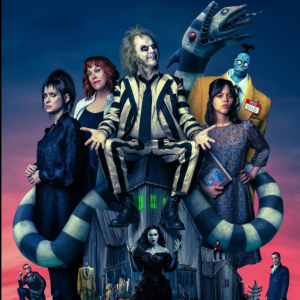Letting sound tell all
Mar 1, 2023
This previously ran in our February 2023 print issue.
Julius Rodriguez, a 24-year old New York native, considers himself a beginner to music production.
He’s been surrounded by music his entire life. As a child, he accompanied his father to jazz clubs and later studied at The Julliard School as a young adult. He eventually left his education in order to tour with artist A$AP Rocky in 2018.
In an interview with PostGenre, Rodriguez shares his hesitancy to stick with the rigid classical style he had been taught for years. Instead, he wished to express himself more creatively.
“I did start with classical, but, in a way, I ran from classical music. I wanted to play jazz music because it flows more freely than just reciting notes on a page,” Rodriguez shares in an interview with Slovinian music magazine, It’s Psychedelic Baby Magazine.
Rodriguez’s first album, Let Sound Tell All, reflects his venture into jazz, R&B, and hip-hop.
The album was released in June of 2022, after years of development. Rodriguez describes his method of creating music as a flexible, creatively-involved process.
Rodriguez values live performances, believing that playing in front of audiences is crucial to a musician’s ability to truly connect with their music. He also speaks to the importance of letting music grow and change with the world around it.
He’s taken inspiration from many music genres, among them gospel, a religious form of music deeply rooted in African American culture.
“There is a lot to learn from the elders. But people also have to realize that things evolve. The world changes,” Rodriguez tells PostGenre. “The key is to find a way to translate the essence of what you learned from elders while finding a new way to approach things.”
Marcus J. Moore, an NPR journalist, agrees with the musician’s sentiment.
“People like him … combine traditional jazz with contemporary rap, electronica and soul, nudging listeners to drop preconceived notions of what Black classical music is supposed to be,” Moore wrote.
African American culture plays a key role in Rodriguez’s music, giving him inspiration from his roots. Rodriguez incorporates elements from other African American musical styles, including R&B, hip-hop, and jazz.
In Rodriguez’s new song, “Where Grace Abounds,” his modern interpretation of the traditional African American music shines through.
“‘Where Grace Abounds’ has always been a special song because it really is more of a meditation that sticks out in a comforting way,” Rodriguez says in an interview with udsicovermusic.com.
Rodriguez’s music has affected Emmaus High School as well. Stuart Speicher, a long-time English teacher and music enthusiast, used the word “hope” to describe how he felt after hearing the melodic strains of Rodriguez’s music.
However, his music isn’t for everyone. Ara Hodereski, another EHS English teacher and an avid music lover, confessed that jazz was not his first choice of music, and despite listening to Rodriguez’s innovative musical pairings, Hodereski did not feel enticed to continue listening.
Rodriguez reminds listeners in his PostGenre interview that the album experience should be individual to each person.
“The idea behind Let Sound Tell All is that sound itself will tell you what you’re listening to. Don’t rely on what other people are saying about the music.”












